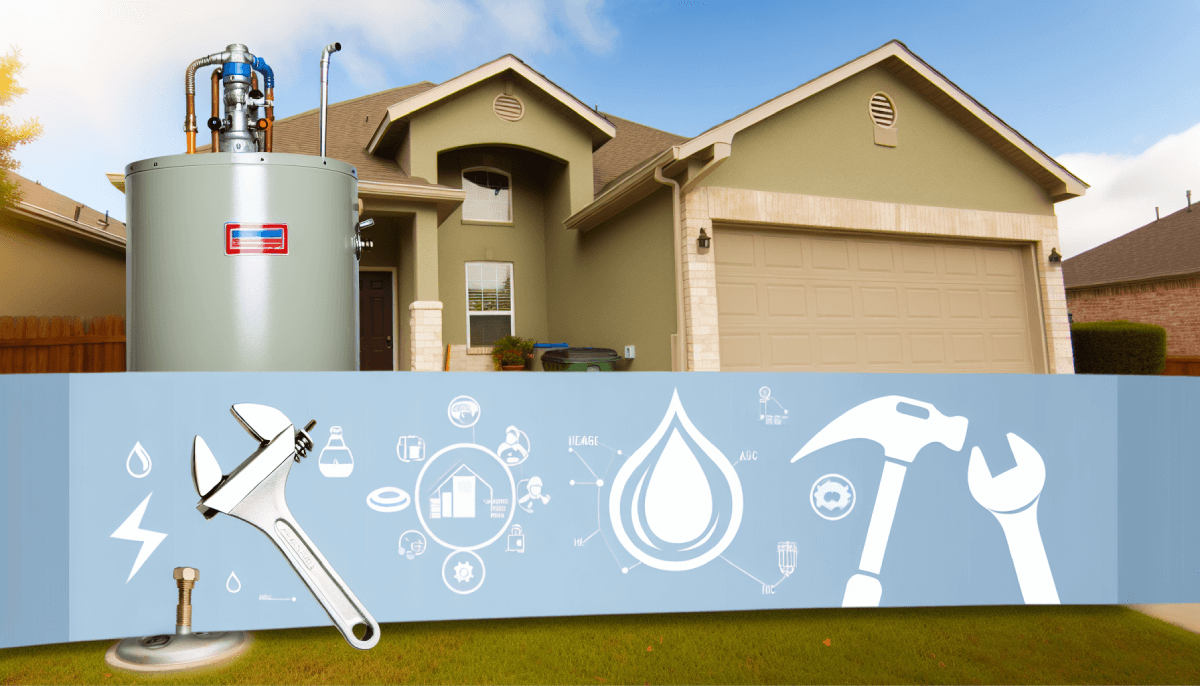
Water heater leaks can be a homeowner’s nightmare. Not only can they cause significant water damage, but they can also disrupt your daily routine. Fixing leaks quickly can stop more problems and expensive repairs. In this guide, we will cover the usual reasons for water heater leaks, signs to watch for, how to diagnose the source, immediate steps to take, when to repair or replace your heater, and tips on preventing future leaks.
Common Causes of Water Heater Leaking
Knowing why your water heater might be leaking is the first step to fixing the problem. Here are some typical reasons:
- Age and Wear: Over time, water heaters can develop leaks due to wear and tear. According to the U.S. Department of Energy, most water heaters last about 10-15 years.
- Loose Connections: The connections to and from your water heater can become loose, leading to leaks.
- Faulty Temperature and Pressure (T&P) Relief Valve: If the T&P valve is not working correctly, it can cause leaks. This valve is essential for preventing excess pressure and temperature in the tank.
- Sediment Buildup: Over time, minerals from your water can build up at the bottom of the tank, causing corrosion and leaks. The EPA provides information on how sediment can affect water quality and appliances.
Signs Your Water Heater is Leaking
Finding a leaking water heater early can save you from bigger problems later. Here are some common signs to watch for:
- Puddles or moisture around the heater: If you notice water pooling around your water heater, it’s a clear sign of a leak.
- Rusty water: Discolored water coming from your taps can indicate that your water heater tank is corroding from the inside.
- Unusual noises: Sounds like popping or cracking can suggest sediment buildup, which can lead to leaks.
Early detection can help you address issues before they become major problems.
Diagnosing the Source of the Leak
After you see signs of a leak, the next step is to find out where it’s coming from. Here’s how you can diagnose the source:
- Top of the tank: Leaks at the top can be caused by loose pipes or a faulty valve. Check for moisture around the pipes and the T&P relief valve.
- Bottom of the tank: If you see water at the base, it might be due to sediment buildup or a corroded tank. Inspect the drain valve and the bottom of the tank for any signs of rust or damage.
- Around plumbing connections: Leaks can also occur where the pipes connect to the water heater. Look for drips or wet spots around the inlet and outlet pipes.
Using a flashlight can help you see better and find the exact spot of the leak. If you’re unsure, it’s always best to consult a professional.
Hot Water Heater Leaking: Immediate Steps to Take
Finding a water heater leak can be stressful, but acting fast can help reduce damage. Here’s a step-by-step guide on what to do:
- Turn off the power supply: If you have an electric water heater, switch off the circuit breaker. For gas heaters, turn off the gas supply. This will prevent any electrical hazards or gas leaks.
- Shut off the water supply: Locate the cold water shut-off valve, usually found at the top of the heater. Turn it clockwise to stop the flow of water into the tank.
- Drain the water heater: Attach a garden hose to the drain valve at the bottom of the tank. Run the hose to a floor drain or outside. Open the valve to let the water drain out, reducing the risk of further leakage.
- Document the leak: Take photos and notes of the leak’s location and severity. This information can be helpful when consulting a professional or filing an insurance claim.
For more detailed emergency steps, see This Old House.
Hot Water Heater Leaking Water: When to Repair vs. Replace
Deciding to repair or replace your water heater depends on how bad the leak is and the condition of the unit. Here’s a guide to help you make the right choice:
When to Repair
- Minor leaks: Small leaks, especially from the top or around connections, can often be fixed by tightening fittings or replacing faulty parts.
- Replaceable parts: If the leak is due to a faulty valve, such as the T&P relief valve, replacing the part can resolve the issue without needing a new heater.
When to Replace
- Extensive corrosion: If there is significant rust or corrosion on the tank, it may be beyond repair. Corrosion can weaken the tank, leading to more leaks and potential tank failure.
- Age of the heater: Water heaters usually last 8-12 years. If your unit is within this age range or older, replacement is often more cost-effective than frequent repairs.
For more information on repair vs. replacement, you can check out this guide from the U.S. Department of Energy.
Preventing Future Water Heater Leaks
Stopping water heater leaks can save you from expensive repairs and water damage over time. Here are some tips to help you keep your water heater in good shape:
- Regular Maintenance: Plan yearly inspections with a professional to check for any signs of wear and tear.
- Flush the Tank: Sediment can build up in the tank over time, leading to corrosion and leaks. Flushing the tank once a year can help prevent this buildup.
- Check the Anode Rod: The anode rod helps prevent rust inside your water heater. Inspect it every few years and replace it if it’s heavily corroded.
- Insulate the Heater: Insulating your water heater can reduce the risk of leaks caused by temperature fluctuations.
For more information on maintaining your water heater, you can refer to this guide from the U.S. Department of Energy.
Professional Help for Water Heater Issues
While some maintenance tasks can be done by homeowners, others need professional expertise. Here are some benefits of hiring a professional for your water heater issues:
- Expertise and Experience: Professionals have the knowledge and experience to diagnose and fix issues quickly and effectively.
- Safety and Efficiency: Handling water heaters can be dangerous. Professionals make sure that repairs and installations are done safely and efficiently.
- Preventive Measures: Regular check-ups by a professional can help identify potential issues before they become major problems.
At Hobson AC, we offer comprehensive water heater services in Aledo, TX, Azle, TX, Granbury, TX, Mineral Wells, TX, and Weatherford, TX. Our team is ready to help with any water heater issues you may have. Contact us today to schedule an inspection or repair.
















